  |
 Sep 18, 2009 - 12:02 PM Sep 18, 2009 - 12:02 PM
|
|
|
Enthusiast   Joined Jan 28, '09 From Austin, TX Currently Offline Reputation: 0 (0%) |
EDIT START 9/22/2009
Pictures of the final version of the downpipe * v-band 38mm TIAL wastegate * All stainless steel * Stainless steel 3" interlocking flex section * Included wideband O2 sensor bung and Toyota O2 sensor bung 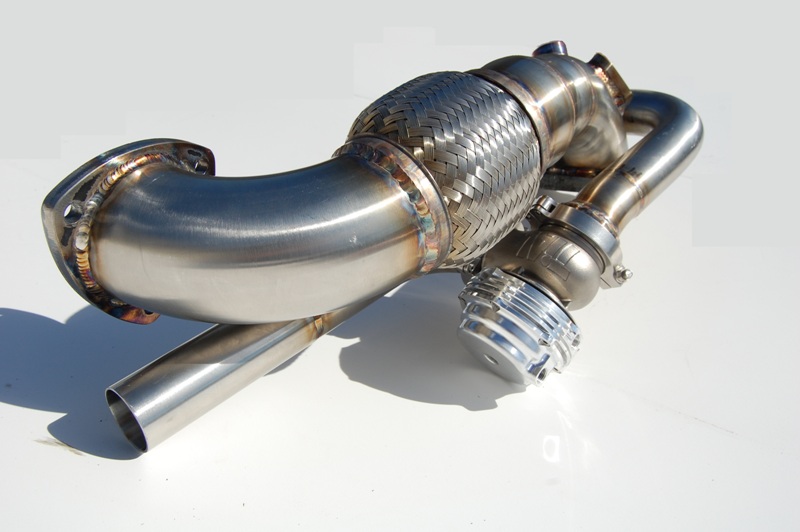 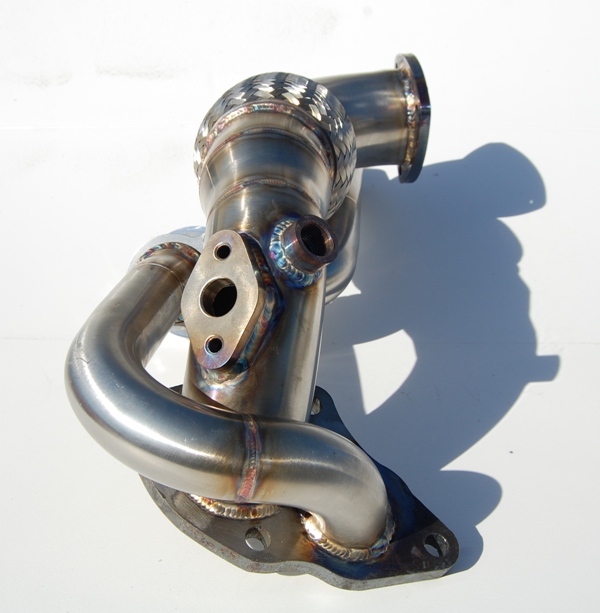 EDIT END 9/22/2009 We're finishing up the final revisions to our turbo kit. The final production version should be available for sale soon (within the next few months). Revisions from what you've seen in the past from various prototypes: * Flex section added to the downpipe * Tial 38mm v-band external wastegate option * Stainless steel turbine housing * -4AN braided stainless steel oil feed * -10AN braided stainless steel oil drain * Stainless steel 3" downpipe * Stock heatshield works and bolts on with our kit * Turbine inlet gasket matched for maximum flow * Various configurations available to support anywhere from an insanely fast spooling 300whp setup all the way to a monster 600whp capable setup that will spool quicker than any other 600whp capaable turbo kit around. * Lifetime warranty on the tubo kit (1 year on the turbo internals) * Kit made in the USA * The turbo's being used with the kit are manufactured by Borg Warner A few more pictures 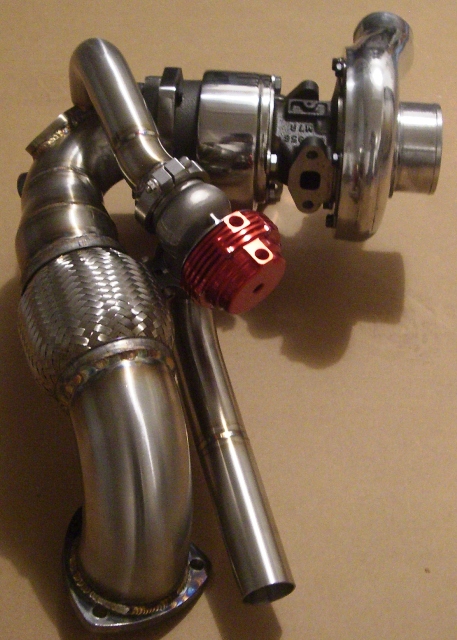 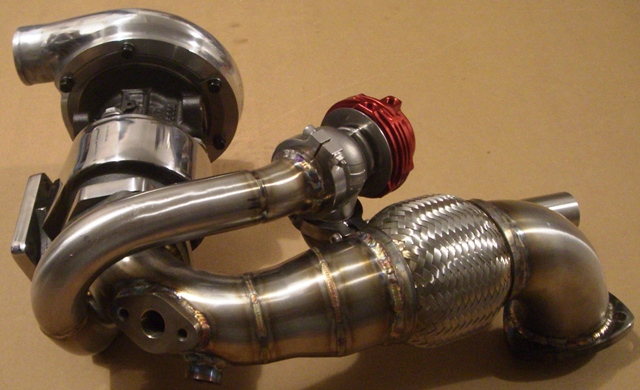 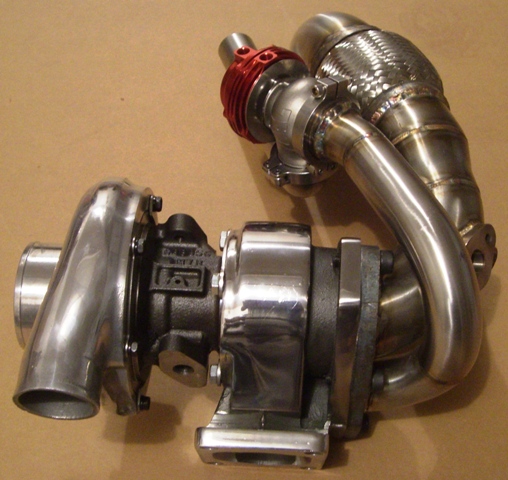 A couple dyno's from various setups that some of our testers have been playing around with: Stock Gen3 3sgte MR2. 93 octane pump gas. Stock Longblock. Stock ECU. Stock fueling. No tuning. EMSPowered 4" intake. EMSPowered S252 Turbo Kit @ 17psi (this turbo is capable of around 450-500whp: 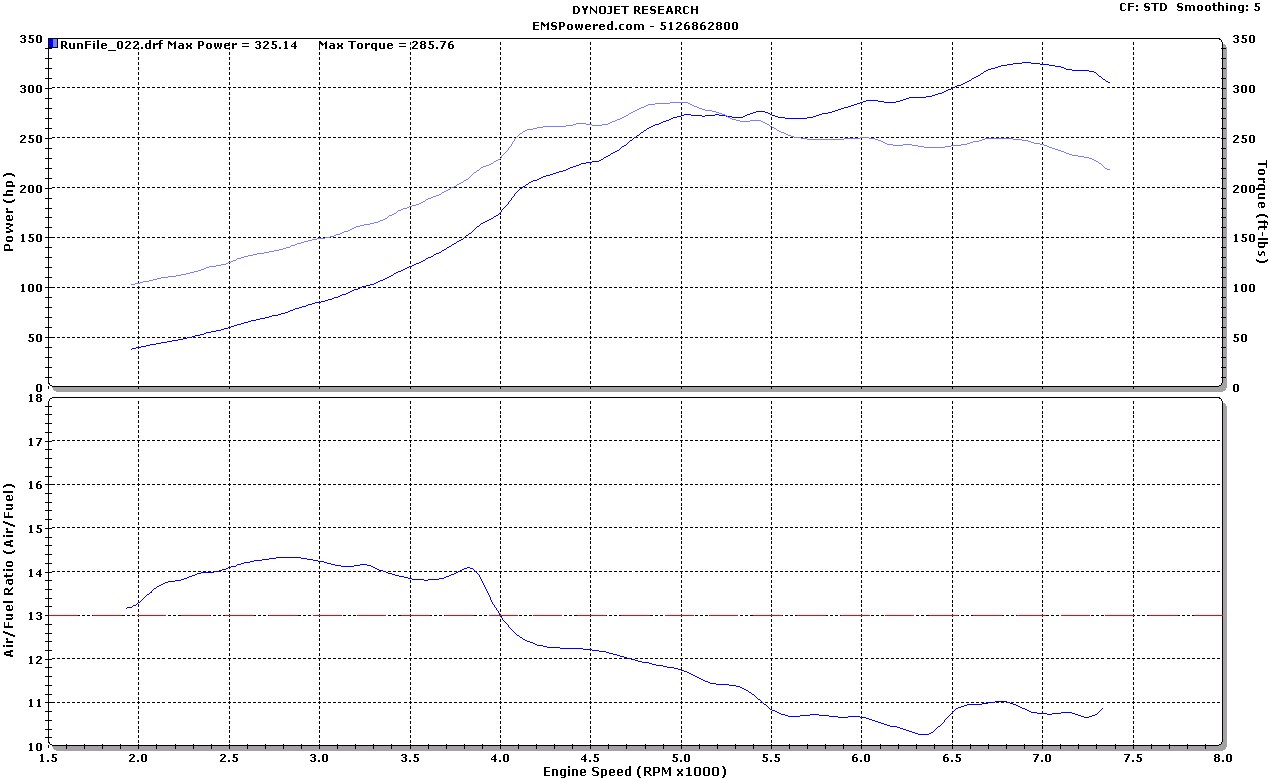 Gen2 3sgte MR2. 93 octane pump gas. Stock cams. 550cc injectors. EMSPowered 50trim Turbo Kit @ 14psi (this turbo is capable of around 400-450whp). This was a prototype kit that was not using our new Stainless Steel turbine housing, so spool is slower by about 150rpm on this dyno and power is lower by about 15-30hp: 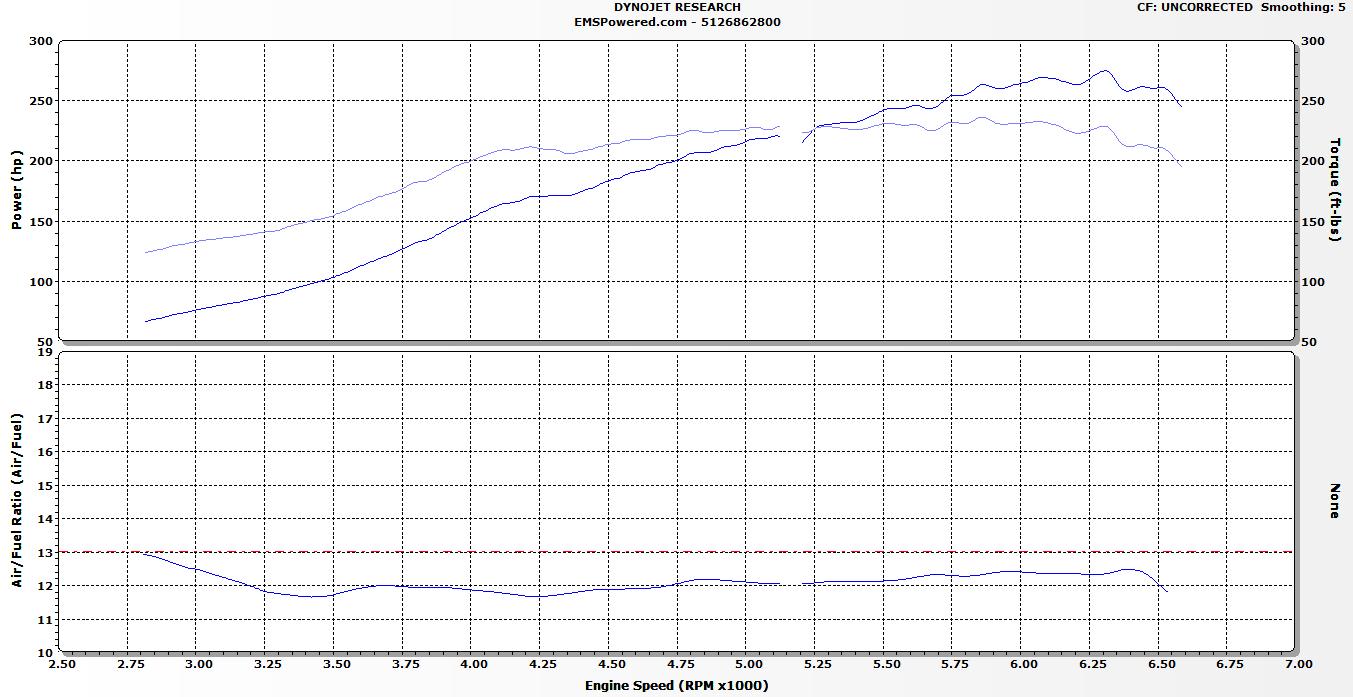
This post has been edited by baktasht: Sep 25, 2009 - 1:10 PM -------------------- |
 Sep 18, 2009 - 1:53 PM Sep 18, 2009 - 1:53 PM
|
|
|
Enthusiast    Joined Apr 27, '09 From West Coast Canada Currently Offline Reputation: 0 (0%) |
would of been nice to of seen this like... 3 weeks ago before i spent 8000$?
|
 Sep 18, 2009 - 2:02 PM Sep 18, 2009 - 2:02 PM
|
|
|
Enthusiast   Joined Jan 28, '09 From Austin, TX Currently Offline Reputation: 0 (0%) |
would of been nice to of seen this like... 3 weeks ago before i spent 8000$? Wow, 8k? return what you bought!! -------------------- |
 Sep 18, 2009 - 2:39 PM Sep 18, 2009 - 2:39 PM
|
|
|
Enthusiast      Joined Mar 29, '07 From Philly Currently Offline Reputation: 11 (100%) |
maybe im missing something here...but on a stock 3rd gen, with simple, simple mods such as a front mount, 3" exhaust, an MBC and a helper spring will easily put out 330HP on 21 psi if not a little more...i dont understand how this turbo kit can be an upgrade if its only putting out 325hp at 17 psi. how manny pounds can be put through it before it maxes out? and what other mods would you need to reach my goal of 450whp on my 2nd gen? looks like an awesome kit, just want some answers and some real prof that this kit will do what you say before i go droping 3k
--------------------  I"M NOT A TOYOTA FAN, IM A FANATIC 1984 accord hatch 5 speed (T-Belt)-Junkyard 1991 VDUB jetta wolfsburg Ed. 5 speed (clutch)-junkyard 1988 Dodge Aries K (sold) 1969 Chevy El camino - Traded for celica 1991 Dodge Daytona-Traded for Celica 1988 Chevy Camaro-Work in Progress 1989 Ford Mustang LX 5.0 - For Sale 1995 Toyota Celica-Work in Progress |
 Sep 18, 2009 - 2:40 PM Sep 18, 2009 - 2:40 PM
|
|
|
Enthusiast    Joined Sep 22, '08 From Bergenfield Currently Offline Reputation: 5 (78%) |
GREAT STUFF BAKTASH, I got my turbo in last week and it looks AMAZING. Cant wait to how is performs.
--------------------
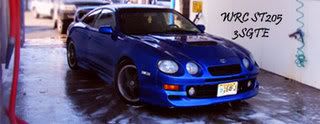 |
 Sep 18, 2009 - 2:48 PM Sep 18, 2009 - 2:48 PM
|
|
|
Enthusiast    Joined Sep 22, '08 From Bergenfield Currently Offline Reputation: 5 (78%) |
maybe im missing something here...but on a stock 3rd gen, with simple, simple mods such as a front mount, 3" exhaust, an MBC and a helper spring will easily put out 330HP on 21 psi if not a little more...i dont understand how this turbo kit can be an upgrade if its only putting out 325hp at 17 psi. how manny pounds can be put through it before it maxes out? and what other mods would you need to reach my goal of 450whp on my 2nd gen? looks like an awesome kit, just want some answers and some real prof that this kit will do what you say before i go droping 3k You are comparing my results of 330whp at 21psi to these results of 325whp at 17 psi. There are MANY different variables between my setup and the setup that was posted here....its really apples and oranges. At 17psi (16.7) I made 287whp....so already this kit makes an additional 40whp at the same boost levels....BUT keep in mind, that the dyons posted were of 2 VERYY different setups. The dyno Baktash posted was on a Stock GEN3, S252 turbo kit offered from EMS powered, 4" intake also from EMS powered, but still on stock exhaust, on a CRAPPPYYY stock side mount intercooler (this was done an MR2 BTW) and it was performed in Texas....where he recorded 120*+ temperatures in the shop. I asked Baktash for the compressor maps for these turbos last winter, and I plotted all of them. This turbo installed on my setup will make about 365-380whp at 17-18psi.....and 400-420whp at 21-22psi. I will have dyno sheets up in the next few weeks as I have this same turbo that I will be installing on the same setup I made 330whp on at 21psi. Stay tuned. --------------------
 |
 Sep 18, 2009 - 3:17 PM Sep 18, 2009 - 3:17 PM
|
|
|
Enthusiast   Joined Jan 28, '09 From Austin, TX Currently Offline Reputation: 0 (0%) |
maybe im missing something here...but on a stock 3rd gen, with simple, simple mods such as a front mount, 3" exhaust, an MBC and a helper spring will easily put out 330HP on 21 psi if not a little more...i dont understand how this turbo kit can be an upgrade if its only putting out 325hp at 17 psi. how manny pounds can be put through it before it maxes out? and what other mods would you need to reach my goal of 450whp on my 2nd gen? looks like an awesome kit, just want some answers and some real prof that this kit will do what you say before i go droping 3k maybe im missing something here...but on a stock 3rd gen, with simple, simple mods such as a front mount, 3" exhaust, an MBC and a helper spring will easily put out 330HP on 21 psi if not a little more...i dont understand how this turbo kit can be an upgrade if its only putting out 325hp at 17 psi. how manny pounds can be put through it before it maxes out? and what other mods would you need to reach my goal of 450whp on my 2nd gen? looks like an awesome kit, just want some answers and some real prof that this kit will do what you say before i go droping 3k You are comparing my results of 330whp at 21psi to these results of 325whp at 17 psi. There are MANY different variables between my setup and the setup that was posted here....its really apples and oranges. At 17psi (16.7) I made 287whp....so already this kit makes an additional 40whp at the same boost levels....BUT keep in mind, that the dyons posted were of 2 VERYY different setups. The dyno Baktash posted was on a Stock GEN3, S252 turbo kit offered from EMS powered, 4" intake also from EMS powered, but still on stock exhaust, on a CRAPPPYYY stock side mount intercooler (this was done an MR2 BTW) and it was performed in Texas....where he recorded 120*+ temperatures in the shop. I asked Baktash for the compressor maps for these turbos last winter, and I plotted all of them. This turbo installed on my setup will make about 365-380whp at 17-18psi.....and 400-420whp at 21-22psi. I will have dyno sheets up in the next few weeks as I have this same turbo that I will be installing on the same setup I made 330whp on at 21psi. Stay tuned. Looks like Jim got to it before I did. Jim pretty much hit the nail on the head regarding some of the differences. -------------------- |
 Sep 18, 2009 - 3:26 PM Sep 18, 2009 - 3:26 PM
|
|
|
Enthusiast      Joined Mar 29, '07 From Philly Currently Offline Reputation: 11 (100%) |
i didnt know all the little detalis...that makes sense then..well i guess that answers that...good stuff...bump for a nice kit
--------------------  I"M NOT A TOYOTA FAN, IM A FANATIC 1984 accord hatch 5 speed (T-Belt)-Junkyard 1991 VDUB jetta wolfsburg Ed. 5 speed (clutch)-junkyard 1988 Dodge Aries K (sold) 1969 Chevy El camino - Traded for celica 1991 Dodge Daytona-Traded for Celica 1988 Chevy Camaro-Work in Progress 1989 Ford Mustang LX 5.0 - For Sale 1995 Toyota Celica-Work in Progress |
 Sep 18, 2009 - 6:49 PM Sep 18, 2009 - 6:49 PM
|
|
|
Enthusiast  Joined Sep 14, '09 Currently Offline Reputation: 1 (100%) |
I truly hate to post seemingly negative comments about admirable endeavors such as this kind, but I can't seem to keep my mouth shut about my personal grievances. So please take what I'm about to say as positively as possible. I really mean no harm by it.
This is ONLY my opinion. As a company or businessman with aspirations of developing a Turbo Kit (or anything) that will increase the performance of an engine that has already been flagged as one having a very high level of performance potential in stock trim, the engineering approach should follow stringent quality control measures to ensure that the end product is both marketable, and a viable purchase for the end user. Considering this, my approach in developing such a kit would be to carefully detail the parameters of testing to be used for the development and fine tuning of the kit to be manufactured. Then, BEFORE beginning to manufacture said upgrade kit, have a fully refurbished/rebuilt BONE STOCK unit operating within the best performance specifications as outlined by the manufacturer. you know static compression, engine clearances, new distributor cap and rotor/spark cables etc etc. This engine should then be put through the full spectrum of tuning and tweaking to observe and document the limitations of the engine's full potential in completely stock configuration from a PERFORMANCE ONLY standpoint. Again just to emphasize, these tests MUST based on the same tuning and testing the engine being used for the turbo kit's development, is expected to go through. Then you can have all the data and dyno sheets from both the OEM spec as well as the upgrade spec setup, to display to perspective buyers of your upgrade kit. This type of approach clearly demonstrates the strong points and weaknesses of the upgrade product and puts both the buyer as well as the manufacturer in the driver's seat in terms of the "no surprises" aspect. This is what makes you a reputable after market performance equipment manufacturer. Just for argument's sake suppose that after the final release of your kit, another private tuner can provide a dyno sheet, clearly displaying that for approximately half the cost of turbo kit she/he was able to fit "drop in", replacement upgrade camshafts to the stock gen3 motor, and a piggyback tuning device, and achieve exactly the same peak dyno figures results with considerably better low RPM torque/response and significantly less installation headache? |
 Sep 18, 2009 - 7:17 PM Sep 18, 2009 - 7:17 PM
|
|
|
Enthusiast    Joined Sep 22, '08 From Bergenfield Currently Offline Reputation: 5 (78%) |
I truly hate to post seemingly negative comments about admirable endeavors such as this kind, but I can't seem to keep my mouth shut about my personal grievances. So please take what I'm about to say as positively as possible. I really mean no harm by it. This is ONLY my opinion. As a company or businessman with aspirations of developing a Turbo Kit (or anything) that will increase the performance of an engine that has already been flagged as one having a very high level of performance potential in stock trim, the engineering approach should follow stringent quality control measures to ensure that the end product is both marketable, and a viable purchase for the end user. Considering this, my approach in developing such a kit would be to carefully detail the parameters of testing to be used for the development and fine tuning of the kit to be manufactured. Then, BEFORE beginning to manufacture said upgrade kit, have a fully refurbished/rebuilt BONE STOCK unit operating within the best performance specifications as outlined by the manufacturer. you know static compression, engine clearances, new distributor cap and rotor/spark cables etc etc. This engine should then be put through the full spectrum of tuning and tweaking to observe and document the limitations of the engine's full potential in completely stock configuration from a PERFORMANCE ONLY standpoint. Again just to emphasize, these tests MUST based on the same tuning and testing the engine being used for the turbo kit's development, is expected to go through. Then you can have all the data and dyno sheets from both the OEM spec as well as the upgrade spec setup, to display to perspective buyers of your upgrade kit. This type of approach clearly demonstrates the strong points and weaknesses of the upgrade product and puts both the buyer as well as the manufacturer in the driver's seat in terms of the "no surprises" aspect. This is what makes you a reputable after market performance equipment manufacturer. Just for argument's sake suppose that after the final release of your kit, another private tuner can provide a dyno sheet, clearly displaying that for approximately half the cost of turbo kit she/he was able to fit "drop in", replacement upgrade camshafts to the stock gen3 motor, and a piggyback tuning device, and achieve exactly the same peak dyno figures results with considerably better low RPM torque/response and significantly less installation headache? I am having trouble understand what your point is. You are trying to give advice as to how this vendor SHOULD HAVE displayed his dyno results? If you are, most vendors offer results of there product in the same fashion as Backtash did (aka as in using testers) which IMO is better for real world performance...especially when you have a few different dyno runs to compare to. You can then find the "average" performance gain expected from what ever product that vendor may be selling. I personally am more interested in seeing 5-10 different dyno setups all running the factory ECU with no tuning capabilities (as then the tune is a constant amongst all setups) then a super risky dyno queen number that was performed on race gas to make a product seem better then it really is. At least with testing a few different cars (testers) you have a constant...and that being the turbo and the tune. And as long as YOUR motor is good health like the motors tested on, you will KNOW what kind of gains you will see. I dont really understand your comparison of this turbo kit to a set of cams either? That is comparing apples to oranges again....maybe you can elaborate on that a bit more. --------------------
 |
 Sep 18, 2009 - 8:15 PM Sep 18, 2009 - 8:15 PM
|
|
|
Enthusiast  Joined Sep 14, '09 Currently Offline Reputation: 1 (100%) |
I am having trouble understand what your point is. You are trying to give advice as to how this vendor SHOULD HAVE displayed his dyno results? If you are, most vendors offer results of there product in the same fashion as Backtash did (aka as in using testers) which IMO is better for real world performance...especially when you have a few different dyno runs to compare to. You can then find the "average" performance gain expected from what ever product that vendor may be selling. I personally am more interested in seeing 5-10 different dyno setups all running the factory ECU with no tuning capabilities (as then the tune is a constant amongst all setups) then a super risky dyno queen number that was performed on race gas to make a product seem better then it really is. At least with testing a few different cars (testers) you have a constant...and that being the turbo and the tune. And as long as YOUR motor is good health like the motors tested on, you will KNOW what kind of gains you will see. I dont really understand your comparison of this turbo kit to a set of cams either? That is comparing apples to oranges again....maybe you can elaborate on that a bit more. Again let me start by saying I'm not and was not trying to bash the product! OK Jim It's easier for me to reply in the reverse order to your questions so i will do just that. QUOTE I dont really understand your comparison of this turbo kit to a set of cams either? That is comparing apples to oranges again....maybe you can elaborate on that a bit more. call me a bean counter but to me, from a consumer standpoint, a purchase is a purchase when the primary objective is horsepower. In that regard I'm not comparing apples to oranges I'm comparing dollars to dollars for the same horsepower result as given on a dyno. That was the entire point I was hoping to make by using that analogy. QUOTE I personally am more interested in seeing 5-10 different dyno setups all running the factory ECU with no tuning capabilities (as then the tune is a constant amongst all setups) then a super risky dyno queen number that was performed on race gas to make a product seem better then it really is. At least with testing a few different cars (testers) you have a constant...and that being the turbo and the tune. And as long as YOUR motor is good health like the motors tested on, you will KNOW what kind of gains you will see. This is useful to you personally but to a wider range of perspective users of the same product many of which have little knowledge or experience like you do, and are half way around the world from you like i am, it offers very little by way of consistency(repeatable results). There is no way to know what condition each motor in the 5-10 setups you refer to were in at the time of testing therefore making it more difficult to someone purchasing a kit to repeat the same results. If you can evaluate that the factory turbo performs to X peak value on an engine that has been blueprinted to manufacturer specifications, then you can evaluate that your upgrade turbo or turbo kit adds Y amount of power, and you have two immediate and considerable advantages. 1. a perspective customer anywhere in the world with little or no knowledge of tuning and upgrades can rest assured that under similar conditions your kit will provide a similar increase in power on an engine of the same rebuild status providing that the external and limiting factors are similar. 2. After sale support and warranty/guaranty issues become less sketchy as it should be quite clearcut that if a customer does not achieve similar performance figures that the turbo or kit is the least likely thing causing the problem. QUOTE most vendors offer results of there product in the same fashion as Backtash did (aka as in using testers) which IMO is better for real world performance...especially when you have a few different dyno runs to compare to. You can then find the "average" performance gain expected from what ever product that vendor may be selling. Most vendors publish information in a manner that is misleading and sometimes completely useless to customers. It does not mean that we should endorse their shortcomings. "having a few different dyno runs to compare -WHAT? - to"? your engine? who's to say that your engine is currently at the same spec as the one they used? and believe it or not even the manufacturer spec is not any real bullet proof sort of guaranty that you will get repeatable performance across the board between engines at that spec. Having to accept that inevitability, the best approach in my opinion is still being able to know the limit of the manufacturer spec which is fairly easily attainable and repeatable around the world. QUOTE I am having trouble understand what your point is. You are trying to give advice as to how this vendor SHOULD HAVE displayed his dyno results? Essentially my advice was based on the premise that depending on your approach in the development of your product the results or dyno results you are able to display can be of more use to perspective customers. |
 Sep 19, 2009 - 7:50 AM Sep 19, 2009 - 7:50 AM
|
|
|
Enthusiast    Joined Sep 22, '08 From Bergenfield Currently Offline Reputation: 5 (78%) |
Again let me start by saying I'm not and was not trying to bash the product! I know you are not bashing, I hope you dont take my comments offensively call me a bean counter but to me, from a consumer standpoint, a purchase is a purchase when the primary objective is horsepower. In that regard I'm not comparing apples to oranges I'm comparing dollars to dollars for the same horsepower result as given on a dyno. That was the entire point I was hoping to make by using that analogy. Ok, I understand saving money while still achieving your desired HP levels. But, I still dont understand how you are using it in this situation. I will merely continue on your comparison of this kit to a set of cams. Price was never spoke about, so we cant actually compare dollar for dollar yet, but yes...the cost of the cams THEMSELVES will be less this turbo kit I am sure. But there are a few things to remember. 1. No cam will you get an additional 80+whp (making out the factory GEN3 fuel system) like bolting on one of these turbos 2. You need to run an EMS (about 2000$ + tuning 5-800$ + the cost of the cams themselves 600$) when you swap out your factory cams for upgraded cams....where as you can get away with just slapping a larger turbo on your stock ECU as long as you keep boost within your fuel trims. This is useful to you personally but to a wider range of perspective users of the same product many of which have little knowledge or experience like you do, and are half way around the world from you like i am, it offers very little by way of consistency(repeatable results). There is no way to know what condition each motor in the 5-10 setups you refer to were in at the time of testing therefore making it more difficult to someone purchasing a kit to repeat the same results. If you can evaluate that the factory turbo performs to X peak value on an engine that has been blueprinted to manufacturer specifications, then you can evaluate that your upgrade turbo or turbo kit adds Y amount of power, and you have two immediate and considerable advantages. 1. a perspective customer anywhere in the world with little or no knowledge of tuning and upgrades can rest assured that under similar conditions your kit will provide a similar increase in power on an engine of the same rebuild status providing that the external and limiting factors are similar. 2. After sale support and warranty/guaranty issues become less sketchy as it should be quite clearcut that if a customer does not achieve similar performance figures that the turbo or kit is the least likely thing causing the problem. Most vendors publish information in a manner that is misleading and sometimes completely useless to customers. It does not mean that we should endorse their shortcomings. "having a few different dyno runs to compare -WHAT? - to"? your engine? who's to say that your engine is currently at the same spec as the one they used? and believe it or not even the manufacturer spec is not any real bullet proof sort of guaranty that you will get repeatable performance across the board between engines at that spec. Having to accept that inevitability, the best approach in my opinion is still being able to know the limit of the manufacturer spec which is fairly easily attainable and repeatable around the world. I dont understand how having 10 dynos results on 10 different motors, all running the stock ECU with the same turbo is LESS consistent of results as ONE dyno that you would like to see achieved on a freshly built motor tuned for maximum hp.....? If this was an accepted way of advertising X hp for Y turbo, there would be A LOT of pissed off costumers out there when they Specifically bought Y turbo with intentions of running X hp at Z psi like the vendor had proclaimed for there street car. But the problem is, is they cant run 13.0-1 AFR's add GOBS of ignition advance on there street car like the vendor could get away with for a few dyno runs with race gas. And over time, the more people that bought Y turbo for X hp, would all hop on these forums and start comparing there ACTUALLY hp on there OWN motors....and the more people that send in there results....you start seeing consistent results. If 10 people post there dynos of the same turbo, on stock ECU (so same tune) with the same bolt ons...and there is a range of 10-30whp difference between each at Zpsi, it would mean that all 10 cars were in proper working condition. And YOU as a potential customer should KNOW the condition of health that your motor is in. After confirming that motor is in fact proper working healthy condition...you KNOW what kind of hp Y turbo will make at Z psi....as you have the same ECU, tune, and other bolt ons as the other members did. Essentially my advice was based on the premise that depending on your approach in the development of your product the results or dyno results you are able to display can be of more use to perspective customers. I dont think more useful, as I think misleading. --------------------
 |
 Sep 19, 2009 - 2:24 PM Sep 19, 2009 - 2:24 PM
|
|
|
Enthusiast      Joined Aug 31, '02 From Philadelphia, PA Currently Offline Reputation: 8 (100%) |
QUOTE 1. a perspective customer anywhere in the world with little or no knowledge of tuning and upgrades can rest assured that under similar conditions your kit will provide a similar increase in power on an engine of the same rebuild status providing that the external and limiting factors are similar. 6gtfour, you are missing the point. This is not the type of product for a customer with little or no knowledge. This is for the diy tuner who has done his research and decided this is the turbo for him. The main thing here you are paying for with this kit is the ability to mate it to your factory manifold, the downpipe, and the hardware to connect the oil lines and make everything work. You also seem to be missing the concept of a "big turbo". Im sure you are looking at the dyno results thinking...."well, jim did this on his stock turbo, so whats the point?" right? Well there is a pretty huge difference between this an a ct20b. This turbo hit the same power at a much lower boost level and is nowhere near being maxed out. You can run this turbo at much higher boost levels then a ct20b and have the potential to hit 400+ hp. Obviously in order to accomplish that kind of goals you WILL have to know what you are doing, and also upgrade other aspects of the motor. This is just one piece of the puzzle. Its up to you to figure out what you need and how it fits together to achieve what you want. -------------------- 15PSI - 30MPG - Megasquirt Tuned
|
 Sep 19, 2009 - 6:36 PM Sep 19, 2009 - 6:36 PM
|
|
|
Enthusiast    Joined Sep 22, '08 From Bergenfield Currently Offline Reputation: 5 (78%) |
QUOTE 1. a perspective customer anywhere in the world with little or no knowledge of tuning and upgrades can rest assured that under similar conditions your kit will provide a similar increase in power on an engine of the same rebuild status providing that the external and limiting factors are similar. 6gtfour, you are missing the point. This is not the type of product for a customer with little or no knowledge. This is for the diy tuner who has done his research and decided this is the turbo for him. The main thing here you are paying for with this kit is the ability to mate it to your factory manifold, the downpipe, and the hardware to connect the oil lines and make everything work. You also seem to be missing the concept of a "big turbo". Im sure you are looking at the dyno results thinking...."well, jim did this on his stock turbo, so whats the point?" right? Well there is a pretty huge difference between this an a ct20b. This turbo hit the same power at a much lower boost level and is nowhere near being maxed out. You can run this turbo at much higher boost levels then a ct20b and have the potential to hit 400+ hp. Obviously in order to accomplish that kind of goals you WILL have to know what you are doing, and also upgrade other aspects of the motor. This is just one piece of the puzzle. Its up to you to figure out what you need and how it fits together to achieve what you want. Well said. --------------------
 |
 Sep 19, 2009 - 10:33 PM Sep 19, 2009 - 10:33 PM
|
|
|
Enthusiast   Joined Jan 28, '09 From Austin, TX Currently Offline Reputation: 0 (0%) |
6gtfour, thanks for the input. I always appreciate input from our customer base. It helps us to see the views of others and what people want to see changed. Although I don't think that we will make as drastic a change in our testing of new products as you suggest, it definitely gives me some things to think about for our future products.
-------------------- |
 Sep 21, 2009 - 6:03 PM Sep 21, 2009 - 6:03 PM
|
|
|
Enthusiast   Joined Jan 28, '09 From Austin, TX Currently Offline Reputation: 0 (0%) |
Pictures of the final version of the downpipe
* v-band 38mm TIAL wastegate * All stainless steel * Stainless steel 3" interlocking flex section * Included wideband O2 sensor bung and Toyota O2 sensor bung  
-------------------- |
 Sep 21, 2009 - 6:08 PM Sep 21, 2009 - 6:08 PM
|
|
|
Enthusiast    Joined Sep 22, '08 From Bergenfield Currently Offline Reputation: 5 (78%) |
Pictures of the final version of the downpipe * v-band 38mm TIAL wastegate * All stainless steel * Stainless steel 3" interlocking flex section * Included wideband O2 sensor bung and Toyota O2 sensor bung   All I have to say is WOWWWWW And will I eventually be getting one of these gorgeous DP's --------------------
 |
 Sep 21, 2009 - 7:10 PM Sep 21, 2009 - 7:10 PM
|
|
|
Moderator      Joined Oct 1, '02 From fall river, ma Currently Offline Reputation: 13 (100%) |
VERY nice. Is this the same basic setup that Texas ace is running?
-------------------- Former Team 5SFTE pro member ;)
 13.6@108MPH, 5SFTE Powered |
 Sep 21, 2009 - 7:44 PM Sep 21, 2009 - 7:44 PM
|
|
|
Enthusiast   Joined Jan 28, '09 From Austin, TX Currently Offline Reputation: 0 (0%) |
VERY nice. Is this the same basic setup that Texas ace is running? texas_ace has been through MANY revisions on his kit since we first started testing and development of the kit. But basically, yes, it's the same kit. Texas_ace's kit is using the S252. His dyno is the one in the first post making around 325whp. -------------------- |
 Sep 21, 2009 - 7:49 PM Sep 21, 2009 - 7:49 PM
|
|
|
Moderator      Joined Oct 1, '02 From fall river, ma Currently Offline Reputation: 13 (100%) |
VERY nice. Is this the same basic setup that Texas ace is running? texas_ace has been through MANY revisions on his kit since we first started testing and development of the kit. But basically, yes, it's the same kit. Texas_ace's kit is using the S252. His dyno is the one in the first post making around 325whp. Yea, I meant the lastest version he is using now. Looks good, looking forward to more results! -------------------- Former Team 5SFTE pro member ;)
 13.6@108MPH, 5SFTE Powered |
  |
4 User(s) are reading this topic (4 Guests and 0 Anonymous Users)
0 Members:
| Lo-Fi Version | Time is now: November 28th, 2024 - 4:29 PM |




